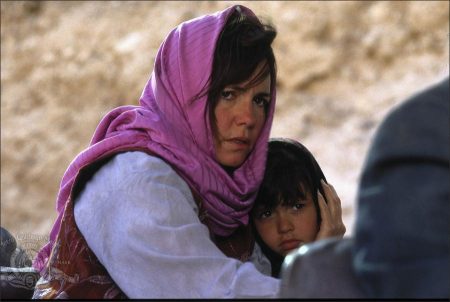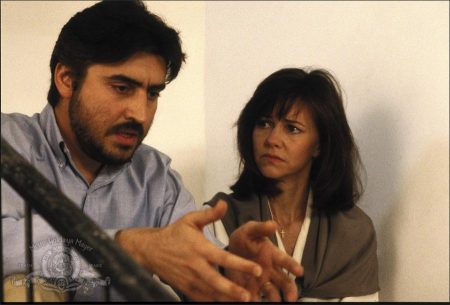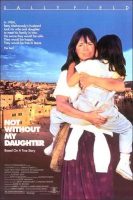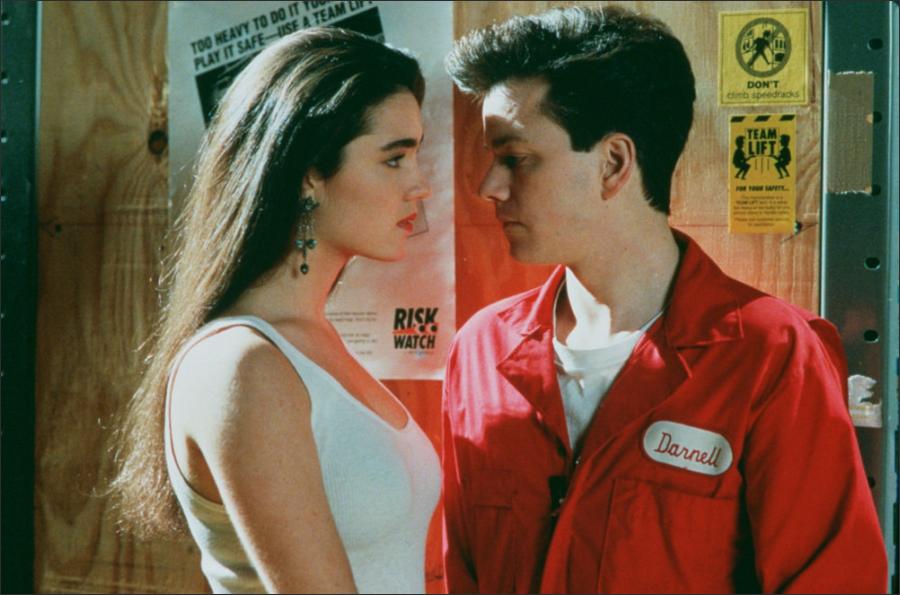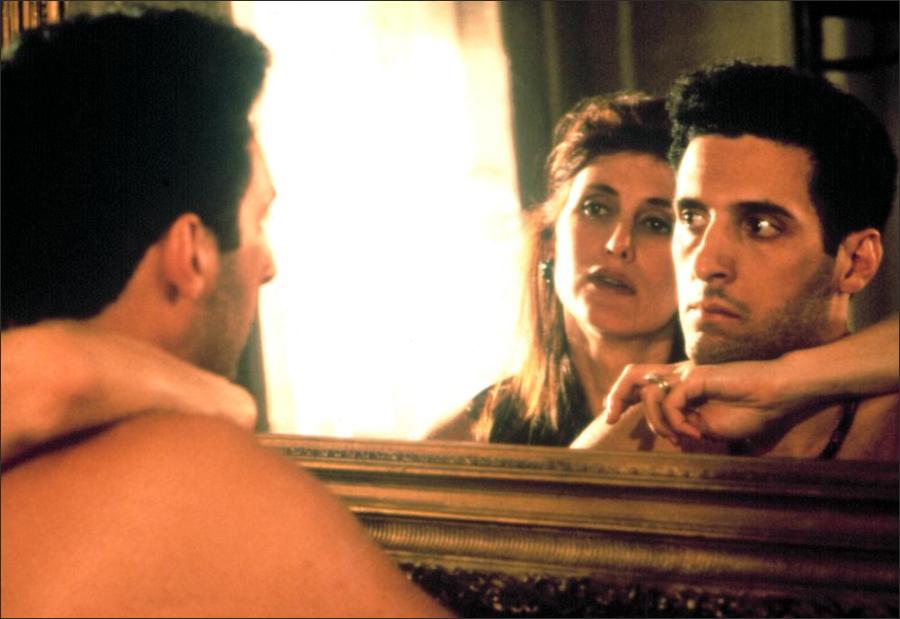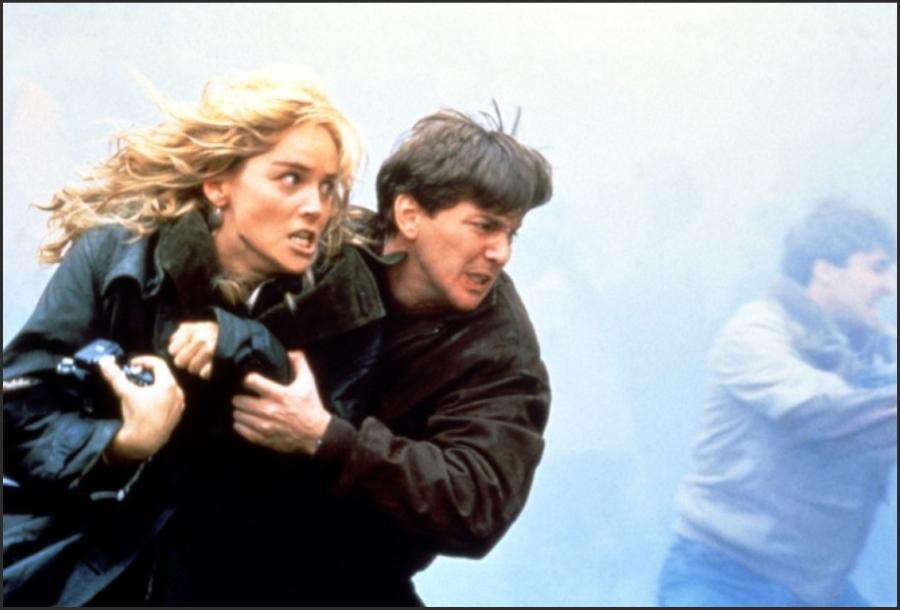Not Without My Daughter movie storyline. “Moody” is an Iranian doctor living in America with his American wife Betty and their child Mahtob. Wanting to see his homeland again, he convinces his wife to take a short holiday there with him and Mahtob. Betty is reluctant, as Iran is not a pleasant place, especially if you are American and female. Upon arrival in Iran, it appears that her worst fears are realized: Moody declares that they will be living there from now on. Betty is determined to escape from Iran, but taking her daughter with her presents a larger problem.
Not Without My Daughter is a 1991 American drama film, based on a book of the same name, depicting the escape of American citizen Betty Mahmoody and her daughter from her abusive husband in Iran. The film was shot in the United States, Turkey and Israel, and the main characters Betty Mahmoody and Sayed Bozorg “Moody” Mahmoody are played by Sally Field and Alfred Molina, respectively. Sheila Rosenthal and Roshan Seth star as Mahtob Mahmoody and Houssein the smuggler, respectively. The film has been criticized for its alleged misrepresentation of Iranians and of Iranian culture.
Film Review for Not Without My Daughter
Who is the most ludicrous ethnic creation on screen right now? Is it the fanatical, small-minded Iranian or the foulmouthed, money-obsessed American or the warmhearted Italian who has to be blasted out of the family house in middle age?
The choice is tough and the possibilities more plentiful than you might think. For while some splashy current films seem teeming with cultures that range from Teheran to Boston, there is very little character lurking beneath their lazy cultural cliches. Whether the stereotypes are as innocuous as the cartoon Italians in “Once Around,” as insulting as the ugly Americans in “The Russia House” or as inflammatory as the evil Iranians in “Not Without My Daughter,” they are shortcuts to character that go to the heart of the films’ failures.
Though “Not Without My Daughter” exploits the stereotype of the demonic Iranian, an idea with some political currency right now, it is not an exploitation film. It is, however, an utter artistic failure, and its reliance on cultural stereotypes is a major cause.
The film makes lurid use of its fact-based story: in 1984 an American named Betty Mahmoody (Sally Field) travels with her Iranian-born husband, Moody (Alfred Molina), and their daughter to visit his family in Teheran. In the film’s reductive approach to character and politics, rabid religious fundamentalism and social conservatism swirl through the air, and Moody catches its symptoms as easily as if he were picking up a flu germ. His promise that the family would return to Michigan in two weeks turns out to be a sham, and Betty is virtually held hostage in her in-laws’ home. She and her daughter must escape illegally from what she calls “this backward, primitive country,” an assessment the film supports.
She shouldn’t have been surprised at her husband’s deception, for on screen the portents were there all along. At first he is viewed as a sympathetic sort, telling his small daughter that after 20 years in this country, “I’m as American as apple pie.” But soon he makes a gesture that seems an evil omen in the context of this simple-minded film: He takes a sacred oath on the Koran. When a foreign religion intrudes on apple-pie America, it is a clear sign of trouble in a film that clumsily uses ethnicity to outline its heroes and villains.
“Not Without My Daughter” has gained more attention than it might have if the Middle East were not exploding. When Moody stands in his Michigan house and tells Betty that her fears are unfounded, that “we’re not going to go sightseeing in the Persian Gulf or anything foolish like that,” the comment reverberates more eerily than it would have a year ago.
But however timely it is, however scrupulous its facts, the film seems unreal because its characters are so one-dimensional, so downright scary from the start. When the Mahmoodys arrive at the Teheran airport, large images of the Ayatollah Khomeini glare down at them from billboards, and they are surrounded by black-clad women who are meant to be loving relatives, yet who descend on the family like vultures. Why the daughter, little Mahtob, goes so willingly to her aunt, who resembles a witch in a Disney cartoon, is one of the smaller questions the film raises.
The larger issue has to do with Moody’s abrupt transformation and his secret decision, made before leaving Michigan, that he would keep his family in Iran. Whatever psychological reasons might have been behind such a move, they are not readily apparent in the film. Here, he seems a pure product of his culture, a mysterious, misogynistic Easterner. “Everything is so different,” he says about the 10 years and the Islamic revolution that have intervened since his last visit home. Yet he adjusts in a flash. He forbids Betty to use the phone or to leave the house without him and is backed up by everyone from his family to Mahtob’s teachers.
When one exceptional Iranian says of Moody’s family, “They’re from the provinces; they’re more fanatical than most,” it is a meaningless disclaimer, for the film views fanaticism as the Iranian national character. And because the people are portrayed so unrealistically, the story’s valid and important social criticism — under Iranian law, Betty had no legal rights to her daughter — is reduced to melodrama and undermined as well.
At least one persistent stereotype in “Not Without My Daughter” makes for an odd, revealing parallel. There are few similarities between this film and “The Sheltering Sky,” Bernardo Bertolucci’s elegant, seductive, elliptical tale of Westerners wandering the through North Africa after World War II. Yet both heroines, traveling with a tribe through the desert, wake to find themselves being assaulted. In “Not Without My Daughter,” Betty is saved by another tribesman, while in “The Sheltering Sky” the grief-stricken American played by Debra Winger eventually gives herself over to a mad sexual adventure and escape into a harem.
The image of the turbaned tribesman creeping over the sand to attack the American woman is part of the exoticism and danger that imbues “The Sheltering Sky”; it is a cliche, but it exists to serve the plot and the heroine’s fantasies rather than to characterize an entire race. The same image is just one more nasty stereotype in “Not Without My Daughter.”
Not Without My Daughter (1991)
Directed by: Brian Gilbert
Starring: Sally Field, Alfred Molina, Sheila Rosenthal, Roshan Seth, Sarah Badel, Mony Rey, Georges Corraface, Mary Nell Santacroce, Marc Gowan
Screenplay by: David W. Rintels
Production Design by: Anthony Pratt
Cinematography by: Peter Hannan
Film Editing by: Ofer Bedarshi, Terry Rawlings
Costume Design by: Nic Ede
Set Decoration by: Anat Avivi
Art Direction by: Avishay Avivi, Desmond Crowe
Music by: Jerry Goldsmith
Distributed by: Metro-Goldwyn-Mayer
Release Date: January 11, 1991
Views: 340
